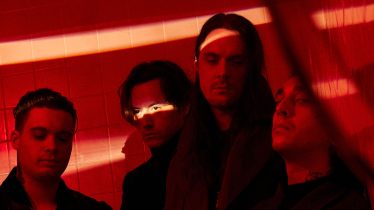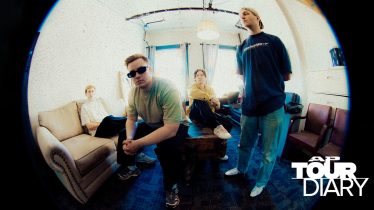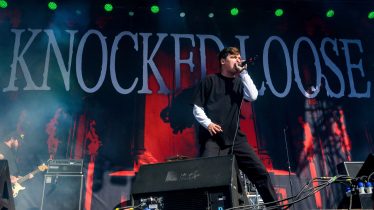Track By Track: Hands Like Houses, ‘Unimagine’ (part 2)
In this two-part track by track written by Hands Like Houses vocalist Trenton Woodley, we take you inside the band's latest album Unimagine.
—
This album is about happiness –not the hollow, temporary happiness that is based on unrealistic expectations, but contentment out of understanding our present and being genuinely appreciative of real, worthwhile life. Lyrically a lot of these songs are about me challenging myself in my own struggles as a musician and in spending so much time away from home. Everything is perspective, and being able to view the contrasting sides of a journey allows understanding so that we can better make the choices that give us opportunities to be happy.
“A Tale Of Outer Suburbia”
This is a song about anxiety, built on the metaphor of a bear displaced by a town being built on the edge of his forest. It's the one song on the album that doesn't “resolve,” which for me is a representation of anxiety itself. It's an overwhelming feeling of helplessness that channels through nervousness, desperation, anger and numbness all at once, and usually very suddenly. I don't want to glorify a negative influence, and it's my hope that by writing this, I and others can actually better handle it through
understanding.
“Oceandust”
Oceandust is a song about perspective, drawing on a similar concept to “Weight.” I wrote a poem in high school about sand and the years upon years of torment and trial a single grain goes through to end up what and where it is, and that's where the inspiration for this song came from. It's about knowing how relatively insignificant we are in time and space and to view our problems accordingly. Once again, it's a rejection of empty, mindless “happiness” as a mood or motivator, instead choosing genuine, supported satisfaction and contentment based on understanding and experience.
“No Parallels”
This song is about ambition and choices, as well as a statement of
contentment in our path and direction. Everyone lives under expectations, of themselves or of others, and we largely live in a society where those in authority over the last few generations have tried to domesticate us. I think a core theme is that there is nothing wrong with choosing a normal life. We don't have to be successful, we don't have to be adventurous, we don't even have to be admirable. As I see it, we only need to understand ourselves and our present enough to be not just content but happy and appreciative of our choices. It's about stepping out from expectations and rediscovering our “wild” heart that is free to choose what we want to do. Even if that is “normal,” what we believe, what we choose is not important; it's why we believe it, why we choose it. That is what is most important to me.
“Fountainhead”
“Fountainhead” is about artistic integrity and ownership. One thing I've found as a musician is this sense of entitlement a lot of “fans” have toward music and musicians. They expect albums to cater to their personal taste and never grow or vary, or they expect musicians to give their entire life and ability to their fans, often with little respect for the artist's own space, own security or their own patience. “Fans” worship fame instead of actual substance, and seem to care more about an artist as the product, rather than the art. At the end of the day, we don't belong to our fans; we belong to ourselves. Our music doesn't belong to our fans, it belongs to us. The important thing is that we choose to share our expression, our ability. We respect our fans as people who make our journey possible; they give us purpose and opportunity. But at the same time we need the same respect as artists—to be able to follow our own direction and path. We put a huge value on the expression and exchange of free will. It's one thing to speak, it's another to be heard; it's one thing to hear, and it's another to listen. We have chosen to speak, and we hope people listen. We are people, not products, and we genuinely
want to be seen and appreciated in that context.
“Wisteria”
“Wisteria” is one of the first song concepts that came about, and ended up shaping the direction for the album. It's about a time in my life when I was completely torn between two different paths I could take and I had a lot of trouble reconciling what I wanted. In a way it's actually a continuation of “The Sower” from Ground Dweller. Indecision over what I wanted, where I wanted to go, who I wanted to be was tearing me apart. It was one of the darkest points in my life because I just didn't feel like I was strong enough to keep it all together. In a way I almost lost everything. I felt completely dead and empty. Eventually something changed inside me, and as painful as it was, I knew that I had to swallow my weakness and make both paths into one. I took the struggles that overwhelmed me when I was down (the “branches in my bones”) and made them into part of me, replacing the weakness with strength. I actually had to fight to make the bridge work lyrically as this song took a lot of culling to make it fit into the song without being too long or too wordy.
Because it was a very personal song, it was insanely hard to let go of the words I had written, but in the end the last line of the bridge is what made this song what it is: “I was alive all along.” As a point of interest, September is the first month of spring in Australia, and in our hometown of Canberra, September means clear skies but icy winds that can cut you to the bone. But if you can escape the wind, it's beautifully still and warm. The metaphor fit perfectly for the narrative of the song, and to be able to make a reference to home made it worth including!
“A Fire On A Hill”
This song is very much the closer – but in the way it could have opened the album. It's written out of the pressure and expectation around beginning and then continuing a journey – when the direction has taken on a life and soul of its own, particularly in the context of music. Our goal has always been to make music that lives and breathes on its own – not manufactured like technology, and not designed like it's trying to better everything before it. Our career has flourished pretty quickly, to a point where it could easily consume us and burn out of control. We express ourselves through this music, I express myself through these lyrics – we want it to keep growing but not in a way that burns bright for a moment and then disappear – we want it to last. Every chapter has it's end of course, but for us we want to make music that people remember and treasure, music that lasts longer than our career as musicians. So it's about feeding that 'soul', giving it life and continuing to let it grow with the respect it deserves.







